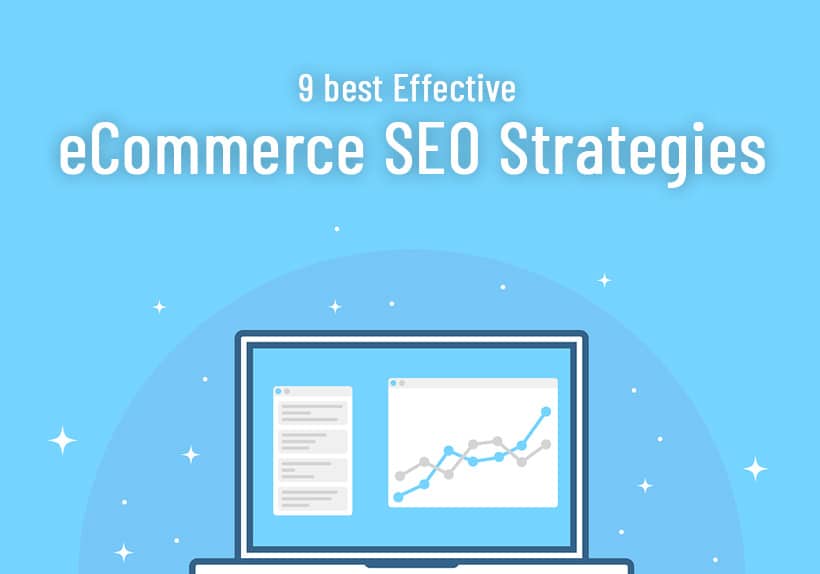9 best Effective eCommerce SEO Strategies

In today’s world, eCommerce has become an essential part of businesses and has revolutionized our shopping. With the increasing competition in the digital market, it’s essential to stay ahead by optimizing your eCommerce website for search engines. eCommerce SEO is all about improving the visibility and ranking of your online store on search engines like Google, Bing, and Yahoo. In this article, we will share the nine best effective eCommerce SEO strategies that will help you optimize your website and improve your online sales.
9 Best Effective eCommerce SEO Strategies:
-
Conduct Keyword Research
Keyword research is the foundation of eCommerce SEO. It helps you identify your potential customers’ keywords to search for your products or services. Use keyword research tools like Ahrefs, Google Keyword Planner, and SEMrush to find your eCommerce website’s most relevant and high-traffic keywords.
-
Optimize Your Product Pages
Product pages are the heart of every eCommerce website. Optimize your product pages by including relevant keywords in the title tag, meta description, and URL. Also, include high-quality product images and videos to enhance the user experience.
-
Improve Your Website Speed
Website speed is a critical factor in eCommerce SEO. A slow-loading site can negatively affect your search engine rankings and user experience. Use website speed testing tools like Google PageSpeed Insights and GTmetrix to identify and fix website speed issues.
-
Optimize Your Site for Mobile
Mobile optimization is essential for eCommerce SEO. With the increasing number of mobile users, it’s crucial to have a mobile-friendly website that offers a seamless user experience. Use responsive design and mobile-friendly layouts to optimize your eCommerce website for mobile devices. The importance of mobile optimization for eCommerce SEO.
-
Build High-Quality Backlinks
Backlinks are an essential factor in eCommerce SEO. They aid search engines in understanding the relevancy and authority of your eCommerce website. Build high-quality backlinks from authoritative websites by guest blogging, broken link building, and influencer outreach.The importance of building high-quality backlinks for eCommerce SEO.
-
Use Schema Markup
Schema markup is a code that aids search engines in understanding the content and structure of your website. Use schema markup to provide additional information about your products, such as reviews, ratings, and prices. This will enhance the visibility and click-through rate of your product pages.
-
Optimize Your Category Pages
Category pages are an essential part of eCommerce SEO. Optimize your category pages by including relevant keywords in the title tag, meta description, and URL. Also, include high-quality category images and descriptions to enhance the user experience.
-
Use Social Media
Social media can play a significant role in eCommerce SEO. Use social media platforms like Facebook, Twitter, and Instagram to promote your products and drive traffic to your eCommerce website. Also, engage with your followers and customers to build brand loyalty and trust.
-
Monitor Your Analytics
Analytics is an essential tool for eCommerce SEO. Monitor your website traffic, bounce rate, conversion rate, and other metrics using tools like Google Analytics and Adobe Analytics. Use this data to identify website issues and opportunities for improvement.
FAQs:
Q. What is eCommerce SEO?
A. eCommerce SEO is optimizing your eCommerce website for search engines. It applies to improving the visibility and ranking of your online store on search engine result pages (SERPs).
Q. How long does it take to see results from eCommerce SEO?
It can take several weeks to months to see significant results from eCommerce SEO. It depends on various factors, like the size of your website, the level of competition in your niche, and the quality of your SEO efforts. Patience and persistence are essential when it comes to eCommerce SEO.
Q. How often should I update my product pages for SEO?
Regularly updating your product pages is an excellent way to keep your website fresh and relevant. You can update your product pages by adding new content, images, and videos, improving page load speed, and fixing technical issues. Aim to update your product pages at least once every 3-6 months.
Q. How can I improve my website’s loading speed for better SEO?
To improve your website’s loading speed, you can do the following:
- Compress images to reduce their file size
- Use a content delivery network to serve your website content from a location closer to your visitors
- Minimize HTTP requests by reducing the number of images, scripts, and stylesheets on your pages
- Use caching to store frequently accessed content on your visitors’ browsers
- Optimize your code and remove unnecessary elements or plugins that slow down your website.
Q. How can I use social media for eCommerce SEO?
You can use social media for eCommerce SEO by doing the following:
- Advertising your services and products on social media platforms
- Engaging with your followers and customers
- Building brand loyalty and trust through social media interactions
- Using social media to obtain backlinks and improve your website’s authority
- Leveraging user-generated content on social media to enhance your website’s user experience.
Q. How can I monitor my website’s analytics for eCommerce SEO?
You can monitor your website’s analytics for eCommerce SEO by using tools like Google Analytics and Adobe Analytics. These tools can help you track website metrics like traffic, bounce rate, conversion rate, and revenue. You can use these insights to identify opportunities for improvement and optimize your eCommerce SEO strategy accordingly.
Q: What are the best eCommerce SEO strategies?
Some of the most effective eCommerce SEO strategies include conducting keyword research, optimizing product pages, creating high-quality content, building backlinks, utilizing social media, optimizing images and videos, optimizing for mobile devices, monitoring analytics, and staying up-to-date with search engine algorithm changes.
Conclusion:
In conclusion, eCommerce SEO is crucial for the success of your online store. You can optimize your website and increase your online sales by implementing the nine best practical eCommerce SEO strategies outlined in this article. Remember to conduct keyword research, optimize your product and category pages, improve your website speed and mobile optimization, build high-quality backlinks, use schema markup, leverage social media, and monitor your analytics. With the right eCommerce SEO strategies, you can enhance your search engine rankings, drive more traffic to your website, and boost your online sales.

